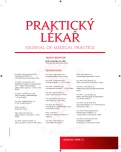Laxatives – safe and effective
Authors:
J. Martínek
Authors‘ workplace:
Klinika hepatogastroenterologie
; Přednosta: prof. MUDr. Julius Špičák, CSc.
; Institut klinické a experimentální medicíny, Praha
Published in:
Prakt. Lék. 2014; 94(2): 79-82
Category:
Of different specialties
Overview
Constipation is a syndrome on which approximately 20% of the population complains. There are three main causes of constipation: slow transit, anismus and obstructive defecation syndrome. Outlet obstruction (= ODS syndrome or anismus) can be successfully treated by physiotherapy or surgery. In patients with severe slow transit constipation, there is often need for long term treatment with laxatives. There are several types of laxatives: volume, osmotic, stimulative and others. Laxatives can be also used for bowel cleansing before colonoscopy or surgery. There are several myths about laxatives and many doctors as well as patients believe in. For example, it is believed that laxatives are harmful, people can develop a dependence and that they can worsen constipation once already present. No such myth has ever been confirmed and evidence based medicine rather shows that even long-term laxative treatment is safe and effective. Of course, high quality data definitely confirming the long term safety are lacking but there are no valid data showing that treatment with laxatives is risky. Doctors should not discourage patients with laxative to take them if they help and are indicated. A new product on the Czech market represent bisacodyl suppository.
Keywords:
sodium picosulphate – constipation – laxatives
Sources
1. Bengtsson M, Ohlsson B. Retrospective study of long-term treatment with sodium picosulfate. Eur J Gastroenterol Hepatol 2004; 16(4): 433–434.
2. Church G. Evacuant suppositories. a comparison of Dulcolax and glycerin. Scott Med J 1959; 4(2): 94–95.
3. Ghadially, FN, Walley VM. Melanoses of the gastrointestinal tract. Histopathology, 1994; 25(3): 197–207.
4. Goebos, K. Laxatives and intestinal epithelial cells: a morphological study of epithelial cell damage and proliferation. Verh K Acad Geneeskd Belg 1995; 57(1): 51–74.
5. Kamm MA, Mueller-Lissner S, Wald A, et al. Oral bisacodyl is effective and well tolerated in patients with chronic constipation. Clin Gastroenterol Hepatol 2011; 9(7): 577–583.
6. Martinek J. Zácpa a přežívající mýty. Laxativa. Gastroent. Hepatol. 2012; 66(4): 249–255.
7. Miller-Lissner SA, Kamm MA, Scarpignato, et al. Myths and misconceptions about chronic constipation. Am J Gastroenterol 2005; 100(1): 232–242.
8. Mueller-Lissner S, Kamm MA, Wald A, et al. Multicenter, 4-week, double-blind, randomized, placebo controlled trial of sodium picosulfate in patients with chronic constipation. Am J Gastroenterol 2010; 105(4): 897–903.
9. Ryan F, Anobile T, Scutt D, et al. Effects of oral sodium picosulphate Picolax on urea and electrolytes. Nurs Stand 2005; 19(45): 41–45.
10. Tzavella K, Schenkirsch G, Riepl RL, et al. Effects of long-term treatment with anthranoids and sodium picosulphate on the contens of vasoactive intestinal polypeptide, somatostatin and substance P in the rat colon. Eur J Gastroenterol Hepatol 1995; 7(1): 13–20.
Labels
General practitioner for children and adolescents General practitioner for adultsArticle was published in
General Practitioner

2014 Issue 2
- Advances in the Treatment of Myasthenia Gravis on the Horizon
- Hope Awakens with Early Diagnosis of Parkinson's Disease Based on Skin Odor
- Memantine in Dementia Therapy – Current Findings and Possible Future Applications
- Memantine Eases Daily Life for Patients and Caregivers
- Possibilities of Using Metamizole in the Treatment of Acute Primary Headaches
-
All articles in this issue
- Poverty
- Allergic bronchopulmonary aspergillosis
- Up-to-date radiotherapy for prostate cancer
- Discussions on ethical issues of medicine and health care as an integral part of teaching ethics to medicine students
- Assessment of fitness to work at night
- Laxatives – safe and effective
- One year experience with dependence degree assessment for the purpose of care allowance
- Molecular mechanisms of anti-cancer treatment resistance in prostate tumours
- Premature ejaculation
- General Practitioner
- Journal archive
- Current issue
- About the journal
Most read in this issue
- Assessment of fitness to work at night
- Laxatives – safe and effective
- Allergic bronchopulmonary aspergillosis
- Up-to-date radiotherapy for prostate cancer
